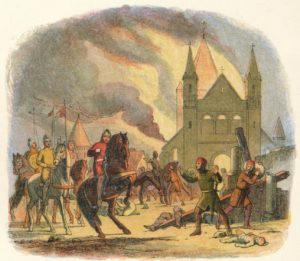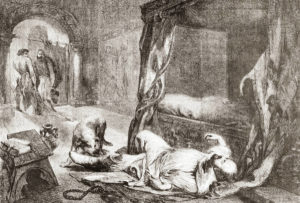
William the Conqueror was not likely to be a person who mellowed-out in his final days. His temper was still quick to anger and he did not hesitate to lay waste to his enemies’ lands at the slightest provocation. He had become excessively fat, and it was said that his antagonist King Philip of France made an insulting comment about William’s bulk that enraged the Norman, who swore to take revenge. And he did.
In England, the year 1087 was full of famine, pestilence and fire. On the continent, William added his own devastation to the Vexin (the border between France and Normandy) and took especial aim at the town of Mantes, which he destroyed totally. On August 15, as he was encouraging his men to throw more wood on the flames, his horse stumbled, throwing William hard against his saddle pommel.
The injury turned out to be mortal. Reeling from shock, William was removed to nearby Rouen where he was housed in the priory of Saint Gervase. There he lingered for several weeks in sickness and pain surrounded by the Bishops and Abbots of the land, and according to Orderic he repented of his evil ways and even admitted that he had wrongly invaded England. He is said to have especially regretted the Great Harrying of the North.
On a Thursday morning in September, William breathed his last. Already, his heir William Rufus and younger brother Henry were already gone, on their way to claim their own—William the crown and Henry his 5000 pounds. As William expired, the remaining prelates and nobles scattered to the four winds, intent on protecting their homes and possessions. All feared the anarchy that would inevitably settle on the land until law could be reestablished. Once the coast was clear, even William’s servants set about stripping the body and the room of all its trappings, so that the corpse was left practically naked and all alone on the floor of his chamber for a whole day.

Finally, a single rustic knight by the name of Herlwin volunteered to take charge of collecting, washing and preparing the body for its funeral—at his own cost. As they brought William’s corpse through Rouen and thence to Caen, the funeral cortege was swelled by local prelates and laymen, who brought the body to the Abbey of St. Stephen. But even then William was not allowed to proceed in peace; just as happened on his coronation day, a fire broke out in a nearby house and many of the attendees ran off to fight the blaze as it spread through the town.
And that was not the end of William’s indignities. When the bier was brought into the church, a local knight rose up and asserted that William had stolen the land from his family to build this church, and he forbid that “the body of the robber be covered with my mould, or that he be buried within the bounds of my inheritance” (Orderic). His statement raised a great tumult, until finally William’s youngest son Henry and the prelates in attendance agreed to pay the knight 60 shillings for the seven feet of ground to lay the coffin, and furthermore to pledge the purchase-price of the whole estate, which they later paid.
Once the disturbance was over, they proceeded to move the body to the stone coffin, only to discover that the coffin was too small! There was no recourse except to stuff the awesome bulk into the stone box. But the process proved too much for the flesh and the body burst apart, filling the cathedral with such a stench that they rushed through the rest of the ceremony. And so the great king was left to spend his eternity alone and abandoned, but certainly never forgotten.
Frank M says:
Well written account. William’s noxious posthumous smells offended and scared away all but the hardiest and pious of men!
Chen says:
Poor William! And how embarrassing! Imagine conquering a lot and then having your body burst!